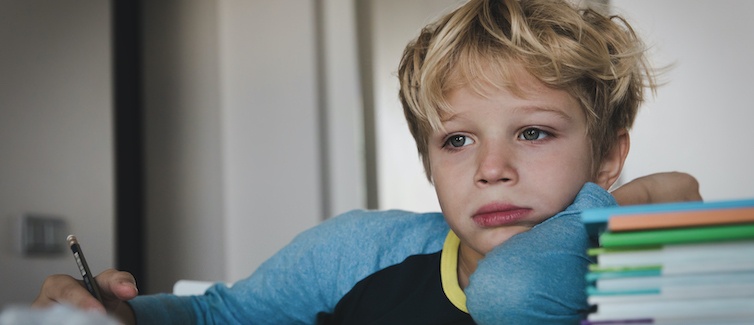If your child’s behavior has changed in a way that is impairing to them and others, you may wonder if counseling is needed. Maybe your child is often moody, angry, or sad — possibly even lashing out or losing interest in school and friends. Is it simply part of growing up, or would counseling for child behavior help?
Mental health is just as important as physical health for children, and conditions like anxiety, obsessive-compulsive disorder, and depression can show up early. According to the Centers for Disease Control and Prevention, 1 in 6 children between the ages of 2 and 8 years old has a mental, behavioral, or developmental disorder.
Counseling by a licensed therapist can help, even if your child’s symptoms are only mild. The earlier you catch any potential problem, the better.
Never Miss a Beat!
Subscribe to Our HealthBeat Newsletter!
Thank you for subscribing!
You can now select the specific newsletters you'd like to receive.
You are already subscribed.
Subscribe to more newsletters in our email preference center.
Sorry, an error occurred. Please try again later.
Get Healthy Tips Sent to Your Phone!
Signs Your Child Would Benefit from Counseling
Sometimes it’s difficult to see the signs, especially when a child shows one or two concerning behaviors from time to time. However, when several of them occur together, the behavior lasts longer than a few weeks, or you simply have a gut feeling that something isn’t right, the answer to “Would my child benefit from seeing a counselor?” is probably yes.
Consider counseling for child behavior if your child:
- Cries uncontrollably or feels sad or anxious a great deal of the time
- Acts out in an aggressive way or overreacts to situations
- Withdraws from friends and spends an increasing amount of time alone
- Becomes clingy and doesn’t want to be away from caregivers
- Loses interest and avoids activities they used to enjoy
- Has a sudden drop in grades at school
- Shows an inability to sit still or concentrate
- Exhibits any pattern of self-harm, such as skin-picking, hair-pulling, or cutting themselves
- Repeats behavior that affects your family life or causes trouble in school
Talking to Your Child About Counseling
Bring up the topic of counseling in a positive way, and never use seeing a therapist as a threat. Instead, frame counseling as going to see a special grown-up who can help them feel better and understand some of the changes they are feeling. Talk about upcoming visits as something to look forward to.
What Techniques Can a Counselor Show Your Child?
Therapy, with or without medication, can help your child learn coping skills and strategies that they can use when they feel anxious or sad. A counselor may want to meet with the whole family for some sessions, especially with younger children. Some forms of counseling include:
- Cognitive behavioral therapy: A counselor will show your child how to identify negative thought patterns that affect their emotions, like anxious thoughts, and give them tools to deal with them.
- Play therapy: Therapists give children toys to play with so that they can act out real-life worries and concerns. By playing through their problems, children can acknowledge their feelings and learn ways to cope.
- Talk therapy: The therapist will ask the child questions and help bring their struggles out into the open. Sometimes just talking about a problem is a huge relief for a child, especially if they imagine that no one else feels the same way.
How to Find a Counselor for Your Child
The first step in finding a counselor who’s a good fit is to check in with your child’s pediatrician, who understands both your child and your family history. Your child’s doctor may want to do a complete physical as well to ensure that your child doesn’t have sleep, vision, hearing, or learning problems that are causing behavioral issues.
At UPMC Children’s Hospital of Pittsburgh, we provide evidence-based behavioral health treatments to children/adolescents and their families. We work closely with community pediatricians, medical specialties, schools, and families to provide family-centered behavioral treatments, teaching children and families skills to minimize distress and maximize wellness. To begin therapy services, no referral is needed. For additional information on our embedded behavioral health programs and developmental medicine, please call 412-692-5100. For all other UPMC Pediatric Behavioral Health services please call 412-246-6668.
Behavioral health counselors at UPMC Family Medicine Health Centers have professional training in different counseling methods to help manage many behavioral health diagnoses. To find a counselor, please call 412-647-8762 or 800-533-8762.
UPMC Western Behavioral Health Child Services is a continuum of behavioral health programs designed to offer prevention, early intervention, and incremental intensity of treatment through multiple levels of care. Services are provided on-site in UPMC facilities, in the home, community, and schools. All sites are currently located within Allegheny County. Most services are available through telehealth. If you need resources, support, or would like to find services for your child, please call 412-246-6668.
Editor's Note: This article was originally published on , and was last reviewed on .
About Pediatrics
From nutrition to illnesses, from athletics to school, children will face many challenges growing up. Parents often will make important health care decisions for them. We hope to help guide both of you in that journey. UPMC Children’s Hospital of Pittsburgh is a national leader in pediatric care, ranking consistently on U.S. News & World Report’s Best Children’s Hospitals Honor Roll. We provide expert treatment for pediatric diseases, along well-child visits, urgent care, and more. With locations across Pennsylvania, Maryland, and West Virginia, you can find world-class care close to home. We also work closely with UPMC Magee-Womens Hospital, a national leader in care for newborns and their mothers. Our goal is to provide the best care for your children, from birth to adulthood and beyond. Visit our website to find a doctor near you.
